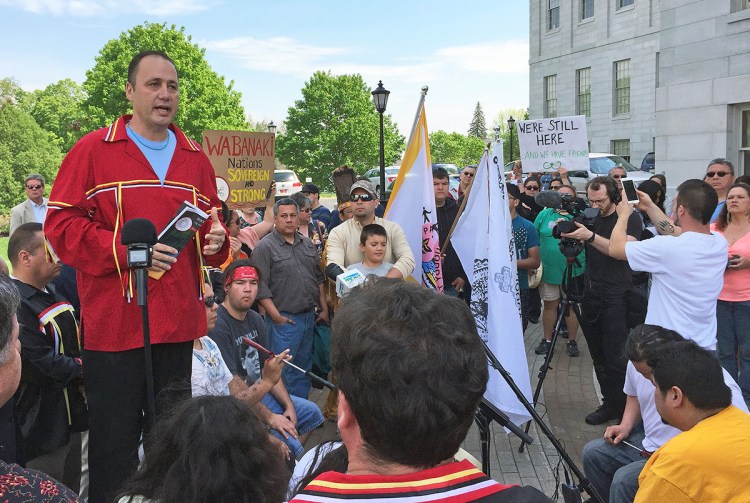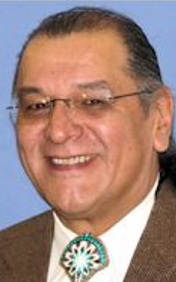state grows
AUGUSTA — The Penobscot and Passamaquoddy tribes withdrew their representatives to the Maine Legislature on Tuesday in the latest sign of a growing rift in the historically troubled relationship between the sovereign tribes and the state.
Rep. Wayne Mitchell of the Penobscot Nation and Rep. Matthew Dana of the Passamaquoddy Tribe walked off the House chamber floor after lamenting what Dana portrayed as state attempts to perpetuate a “guardian-to-ward relationship” with the tribal nations. Tribal leaders assailed policies they say failed to respect the tribes’ sovereignty, denied members sustenance fishing rights and ignored tribal culture.
“Our hope is that one day the state will recognize us for who we are and value the tribes as sovereign partners and engage in a relationship of mutual respect,” Dana said. “Until then, we simply must decide our own future. If history has taught us anything, it certainly is that lesson.”
Gov. Paul LePage’s office responded that the administration is a willing partner, but said “the tribes have had difficulty working together, and they have not been cooperative in working with the state.”
It was unclear Tuesday to what extent the tribes are severing ties with the state. When asked whether Penobscot and Passamaquoddy leaders would choose not to follow some state laws, Chief Fred Moore of the Passamaquoddy Tribe at Pleasant Point replied, “We will confer amongst ourselves and make decisions accordingly.”
The representative of the Houlton Band of Maliseets retained his seat in the Legislature. The state’s fourth tribe, the Micmacs, doesn’t have a seat.
The two withdrawals are the latest in a string of setbacks in tribal-state relations playing out in the State House, in courtrooms and occasionally along the waterways that pass through the tribes’ ancestral lands. Although those incidents date back many years – and are oftentimes rooted in differing interpretations of the landmark Maine Indian Claims Settlement Act of 1980 – tribal leaders said a series of recent events under the LePage administration prompted Tuesday’s protest.
Penobscot Nation Chief Kirk Francis, whose tribe has roughly 2,300 members and controls more than 100,000 acres of land, said he respects the importance of diplomacy, but that the tribes must focus on relationships that allow self-governance and respect tribal culture.
“So to our people today we tell you this: We declare our independence, but we also say to you all that we will walk around with our chins up from now on,” Francis said. “We have gotten on our knees for the last time.”
The statement from LePage’s office acknowledged that Maine’s four tribes – the Penobscot, Passamaquoddy, Maliseet and Aroostook Band of Micmacs – “are sovereigns in their own right.” But his office also made clear the limits of that relationship.
“The relationship between the state of Maine and the individual tribes is a relationship between equals, each with its own set of responsibilities,” the statement says. “Any lands or natural resources owned by the tribes or held in trust are subject to the laws of the state and to the civil and criminal jurisdiction of the courts of the state to the same extent as any other person or lands or natural resources.”
Those “lands or natural resources” have been at the center of several of the recent disagreements.
TENSE RELATIONSHIP DETERIORATES
The Penobscot and Passamaquoddy tribes have clashed with the LePage administration and with Attorney General Janet Mills over sustenance fishing rights – most notably over access to the lucrative glass eel, or elver, fishery – as well as tribal courts’ authority to prosecute domestic violence committed by non-members on reservation land.
The Penobscot Nation is locked in a power struggle with the LePage administration over water-quality standards in the Penobscot River. Earlier this year, the U.S. Environmental Protection Agency sided with the tribe and ordered the LePage administration to craft stricter water quality standards to better protect sustenance fishing on the reservation, or else face federal intervention.
Additionally, tensions between the LePage administration and the Passamaquoddy Tribe have been elevated since 2013, when law enforcement officers seized the gear of tribal elver fishermen and the tribe issued three times as many elver fishing licenses as alloted to it by the state.
In April, LePage revoked a 2011 executive order aimed at improving cooperation among the state and Maine’s four recognized tribes. At the time, LePage said efforts to improve relations with the tribes “have proved to be unproductive because the state of Maine’s interests have not been respected.”
Tribal leaders did not mince words during a rally held Tuesday outside the State House.
“We have gone to great lengths to demonstrate good faith and communication, only to be lied to,” said Moore, chief of the Passamaquoddy reservation at Pleasant Point. “The truth as expressed one day is not the same truth that is understood the following day. And we can’t communicate that way. We cannot conduct business in that manner.”
The tribes also have had several run-ins with Mills, the state’s Democratic attorney general. Mills has defended LePage’s positions on the elver fishery and, more recently, on a bill allowing the tribes to prosecute non-members for domestic violence in their own courts.
The latter bill, L.D. 268, received the full backing of Maine’s tribes and the American Civil Liberties Union of Maine, which argued that it would correct an enforcement hole that has allowed non-tribal members to commit crimes against Native Americans on tribal lands.
Tribal officials say the bill also would bring Maine statutes up to date with federal ones, which authorized tribal prosecutions of non-members for domestic violence with the 2013 Violence Against Women Reauthorization Act.
Mills has opposed L.D. 268, arguing that district attorneys already were willing and able to enforce and prosecute all state laws regardless of an individual’s “tribal membership or race.” Mills also said it was unclear if state courts would permit tribal courts to subject non-tribal members to tribal laws.
In addition, Mills warned that L.D. 268 would amend the 1980 Maine Indian Claims Settlement Act, in which the tribes agreed to be subject to the laws and jurisdiction of Maine, except for “internal tribal matters,” hunting and certain fishing rights on tribal territory. The ambiguity of the phrase “internal tribal matters” has led to decades of debate, however.
“Nothing is black and white with these issues,” Mills said. “Nothing is simple.”
Legislative records show that the Penobscots first sent representatives to the State House in 1823, and the Passamaquoddies in 1842. The tribal representatives’ role in and recognition by state government have been tempestuous, however. An effort in 1939 to give Indian representatives full speaking and voting rights failed and, two years later, lawmakers ousted the tribal representatives altogether.
Their status was gradually restored, and in 1975, tribal representatives were once again given seats and the ability to speak during floor debates.
HOUSE WELCOMES INDIAN VOICES
The Houlton Band of Maliseets gained a House seat in 2012. Although tribal representatives can introduce bills and participate in the committee process, their votes are not counted on the House floor.
House Speaker Mark Eves, D-North Berwick, issued a statement Tuesday urging the tribal representatives to reclaim their seats.
“The Passamaquoddy and Penobscot people will always have a place in the Maine House,” Eves said. “I’m surprised and concerned to see Rep. Mitchell and Rep. Dana withdraw from the Legislature. I am personally committed to working with them and those they represent to ensure their voices are heard in the House chamber. I hope they will reclaim their seats.”
Staff Writer Steve Mistler contributed to this report.
Kevin Miller can be contacted at 791-6312 or at:
Twitter: KevinMillerPPH
Send questions/comments to the editors.






